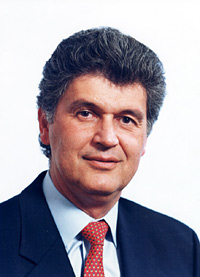 |
 |
 |
 Editorials | Environmental | March 2006 Editorials | Environmental | March 2006  
Mexican Government Plans to Expand Its Nuclear Power Program
 Ioan Grillo - Associated Press Ioan Grillo - Associated Press


| | Alfredo Elias Ayub, director-general of the Federal Electricity Commission. |
Mexico City – The Mexican government plans to expand the nation's nuclear power program to cope with the country's rapidly growing energy needs, the head of the state electricity monopoly said Tuesday.

Alfredo Elias Ayub, director-general of the Federal Electricity Commission, said that the monopoly aims to construct a new nuclear plant, worth about US$4 billion dollars (euro3.4 billion), by 2020 at the latest. The monopoly also is spending US$150 million (euro125 million) on increasing the output at its one existing nuclear plant, the Laguna Verde, in the Gulf coast state of Veracruz, Ayub said.

“We have to think in the long term,” Ayub said. “In the next 20 years (nuclear power) is an energy that we are going to need and that many other countries are going to need.”

The Laguna Verde was built by GE Energy, a unit of the U.S.-based corporation General Electric Co., in 1990. It currently provides Mexico with about 5 percent of its electricity.

Last week, the plant had to be temporarily shut down when a cable overheated.

Ayub denied that nuclear power is dangerous, saying that human error caused high-profile atomic accidents of the past such as that in Chernobyl, Russia, in 1986, when a reactor blew up and spewed out radioactive material for days.

“If the operators follow the procedures then nuclear plants are completely safe,” he said.

Ayub cited plans to build more nuclear plants in France, China and India as evidence that the international community favors atomic energy.

“France bet on the nuclear program many years ago and you can now see with the price of oil at 60 dollars a barrel that it was a great success,” he said.

describes nuclear power stations as an “emission-free” form of energy that could help the world cut down on the fumes blamed for climate change.

Some other European countries such as Sweden and Germany have promised to phase out their aging and unloved nuclear power stations.

No nuclear reactor has been built in the United States since the partial meltdown of the Three Mile Island plant in Pennsylvania in 1979. However, utilities companies have recently proposed constructing a new generation of up to 10 stations between Maryland and Mississippi.

Most of Mexico's energy is currently provided by gas, oil, coal and hydroelectric power.

But the Federal Electricity Commission estimates the nation's electricity needs will increase by more than 4 percent per year, sparking a demand for additional energy sources.

Last month, a gas explosion at a Mexican coal mine close to the U.S. border killed 65 miners. | 
 | |
 |



